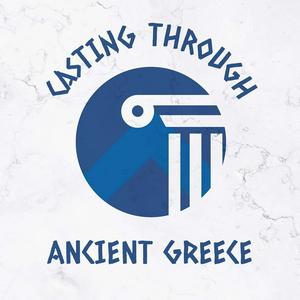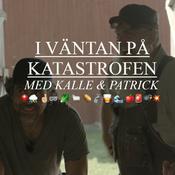133 avsnitt
- Victory monuments told one story; Persian strategy told another. We pull back the curtain on how the Achaemenid Empire absorbed defeat at Salamis, Plataea, and Mycale yet remained a decisive force by changing methods, not goals. Instead of chasing glory with grand invasions, Artaxerxes I prioritized containment, stability, and leverage—allowing satraps in Lydia and Phrygia to steady the western frontier while a smaller, cautious fleet protected trade and preserved options.
From there, influence replaced occupation. We dig into the mechanics of Persian soft power: subsidies that traveled faster than armies, patronage that bent city councils, and diplomacy that rewarded neutrality over risk. Athens saw restraint and assumed weakness, expanding across the Aegean under the Delian League. Sparta turned inward, certain the danger had passed. Both misread endurance for absence, creating the very fractures Persia needed to shape outcomes from a distance.
Across the decade after Mycale, the empire learned to turn Greek rivalry into a strategic asset. Gold outlasted galleys, and patience outperformed spectacle. By the mid-fifth century, Persian support and timing influenced wars it never fought, ensuring that no single polis could dominate unchecked. If you’re curious how superpowers pivot after failure—and how soft power, satrapal governance, and maritime caution can reset a geopolitical game—this story offers a clear, surprising blueprint for durable influence.
Enjoy the episode? Follow, share with a history-loving friend, and leave a review telling us where you see this long-game strategy echoed in today’s world.
Support the show
💬 Stay Connected with Casting Through Ancient Greece
Follow us for updates, discussions, and more ancient Greek content:
🌐 Website
📸 Instagram
🐦 Twitter
📘 Facebook
🎙️ Love the show? Don’t forget to subscribe, leave a review, and share it with fellow history enthusiasts. Your support helps keep the stories of ancient Greece alive! - A shocked city, a careful army, and a plateau that decides everything. We follow the tense weeks after Athens’ first win outside Syracuse, when momentum gave way to method. Nicias, often branded cautious, makes a hard strategic choice: pause late in the season, refill the coffers, request cavalry, and prepare for a siege that can actually hold under pressure. Meanwhile, Syracuse hears Hermocrates at last. His blunt case—discipline over bluster, reform over blame—shrinks a muddled command, tightens training, and sends envoys to Corinth and Sparta to turn a local crisis into a panhellenic cause.
The political map of Sicily comes into sharp focus as Camarina keeps a careful distance, Naxos and Regium quietly help Athens, and both sides court allies who can tip supplies, harbors, and morale. Then the war’s center of gravity jumps across the sea. Alcibiades escapes and arrives in Sparta with insider detail and a plan to exploit Athenian overreach. His advice sparks two decisive moves: dispatching Gylippus to steady Syracuse and fortifying Decelea to bleed Attica. Intelligence, timing, and audacity reshape the conflict more than any single skirmish could.
Through winter 415–414 BCE, the Athenians work with rare clarity. Catana becomes an operating base; ships are refit; scouts trace Syracuse’s walls and water. The conclusion is simple and stark: win the Epipolae Heights or lose the siege before it begins. Spring brings speed. A quiet sail, a rapid landing, and Lamachus’ night march seize Euryelus, the gateway to the plateau. Engineers mark lines. Syracuse counters. For a moment, the expedition reaches its high watermark, the city nearly within an encircling wall. But with Gylippus on the horizon and a reformed Syracuse ready to contest every trench, the hard road truly begins.
Support the show
💬 Stay Connected with Casting Through Ancient Greece
Follow us for updates, discussions, and more ancient Greek content:
🌐 Website
📸 Instagram
🐦 Twitter
📘 Facebook
🎙️ Love the show? Don’t forget to subscribe, leave a review, and share it with fellow history enthusiasts. Your support helps keep the stories of ancient Greece alive! - Victory didn’t end the story; it changed the rules. After Mycale and Plataea, the Persian threat receded, the Aegean opened, and a vacuum pulled Athens, Sparta, and Persia into a new contest—one fought with fleets, diplomacy, and competing visions of security. We walk through the decade that followed 479 BC to show how shattered empires, cautious land powers, and ambitious sea powers redrew the map of Greek politics.
We unpack Persia’s strategic shift from invasion to consolidation: naval losses that invited Ionian revolts, satraps scrambling to stabilize Lydia and the Hellespont, and a measured pivot to subsidies and envoys that exploited Greek divisions. On the mainland, we contrast Sparta’s deliberate restraint—defending the Peloponnese, avoiding distant obligations, and prioritizing social stability—with Athens’ awakening to maritime destiny. The Athenian fleet becomes more than defense; it becomes identity, food security, and leverage, soon anchored by the Piraeus and the Long Walls.
At the heart of the story sits the Ionian question: who protects the liberated cities when Persian garrisons fall away? Athens answers with ships and treaties that coalesce into the Delian League—a standing alliance promising collective security while granting Athens command of contributions and strategy. We explore how the League funds naval expansion, extends operations to Cyprus and the Hellespont, and slowly turns cooperation into hegemony. Along the way, we track the emerging fault line with Sparta, as allied poleis navigate between land hegemony and sea hegemony, and Persia watches for fractures to widen.
By the end, freedom has returned to the Aegean, but unity has not. That paradox—liberation without consensus—sets the foundations for the classical Greek order, Athenian naval supremacy, and the rivalries that will define the fifth century. If power abhors a vacuum, this decade shows who rushed in, why they moved, and how their choices reshaped the world. Subscribe, share, and tell us: which decision mattered most—the Spartan retreat, the Athenian fleet, or Persia’s long game?
Support the show
💬 Stay Connected with Casting Through Ancient Greece
Follow us for updates, discussions, and more ancient Greek content:
🌐 Website
📸 Instagram
🐦 Twitter
📘 Facebook
🎙️ Love the show? Don’t forget to subscribe, leave a review, and share it with fellow history enthusiasts. Your support helps keep the stories of ancient Greece alive! - Bronze flashed on the water and songs filled the air as our fleet left the Piraeus, but the shine faded fast along the Italian coast. Harbors opened while hearts stayed closed, Segesta’s “treasure” dissolved into borrowed plate, and our grand design was forced to contend with supply lists, neutral cities, and the creeping cost of time. We lay out how awe met caution in Magna Graecia, why admiration didn’t translate into alliances, and how an expedition sold on momentum stalled before the straits.
Inside the armada, strategy split three ways. Alcibiades treated diplomacy as the first battlefield, Lamachus argued for a decisive strike, and Nicias warned that every day ashore drained our strength. Then Athens called Alcibiades home to face charges, and he slipped into exile—taking with him both political cover and a unifying vision. Meanwhile, Syracuse moved from rumor to readiness. Hermocrates urged a coalition and preemption; Athenagoras dismissed invasion talk and accused rivals of stoking panic. A measured course prevailed: arm, scout, and prepare. We follow that shift, the quiet coup that delivered Catana, and the dispiriting tour that yielded little more than thirty talents.
The turn comes with a ruse. Nicias baited the Syracusans into marching north as our ships slid south to the Olympion. The battle that followed was tight and testing: veteran cohesion against raw numbers, archers and peltasts picking seams, cavalry blunted by terrain and haste, and a sudden storm breaking nerves. We won the field and raised a trophy, but not the decisive victory that ends a war. From there, the real stakes emerge—where to plant a permanent base, how to choke Syracuse without cavalry, and how to keep a divided command aligned as the city behind us grows impatient.
Sail with us through shifting alliances, political gambits, and battlefield deception as the Sicilian Expedition moves from pageantry to peril. If this story gripped you, follow the show, share it with a friend who loves ancient history, and leave a review with the moment you found most surprising.
Support the show
💬 Stay Connected with Casting Through Ancient Greece
Follow us for updates, discussions, and more ancient Greek content:
🌐 Website
📸 Instagram
🐦 Twitter
📘 Facebook
🎙️ Love the show? Don’t forget to subscribe, leave a review, and share it with fellow history enthusiasts. Your support helps keep the stories of ancient Greece alive! - A continent-spanning empire bore down on a patchwork of rival city-states—and out of that pressure, a people discovered themselves. We follow the Greek victories over Persia from raw survival to a moral origin story, showing how memory, art, and ritual transformed urgent alliance into a lasting idea: Hellenic freedom.
We start with the fragile coalition that met the Persian advance at Salamis and Plataea, then uncover how the meaning of those battles grew in the retelling. Simonides’ epigrams, Pindar’s odes, and Herodotus’ sweeping narrative forged a panhellenic lens through which courage, divine favor, and self-rule became the Greek signature. Monuments like the Serpent Column at Delphi and offerings at Olympia turned sanctuaries into archives of unity, while annual rites at Plataea and Salamis taught that freedom must be renewed, not assumed.
Athens made the memory visible. Rising from a burned Acropolis, the city reframed myth as politics on the Parthenon, casting Greeks versus Amazons and gods versus giants as a code for order resisting tyranny. At the same time, naval power rewired society. Themistocles’ triremes elevated the rowers—the thetes—and widened democratic voice, seeding the Delian League and a new maritime identity. That shift sharpened the contrast with Sparta’s land-first conservatism, foreshadowing rivalry even as the ideal of Hellenic liberty took root.
We connect these threads to later thinkers and leaders. Thucydides uses the Persian War as a baseline of necessary unity. Plato and Isocrates hold it up as a mirror for civic virtue. Alexander taps its emotion to justify conquest. Across centuries, the wars became sacred history and a durable myth: free citizens against imperial despotism, reason over hubris. Listen for a richer view of how battles end but stories begin—and how those stories still guide debates on power, identity, and the price of freedom. If this sparked new questions or changed your view, subscribe, share, and leave a review with the one idea you’ll remember most.
Support the show
💬 Stay Connected with Casting Through Ancient Greece
Follow us for updates, discussions, and more ancient Greek content:
🌐 Website
📸 Instagram
🐦 Twitter
📘 Facebook
🎙️ Love the show? Don’t forget to subscribe, leave a review, and share it with fellow history enthusiasts. Your support helps keep the stories of ancient Greece alive!
Fler podcasts i Utbildning
Trendiga poddar i Utbildning
Om Casting Through Ancient Greece
A podcast about the history of ancient Greece for people new to and familiar with Ancient Greek history.The Casting Through Ancient Greece podcast will focus on telling the story of Ancient Greece starting from the pre history through Archaic Greece, Classical Greece and up to the Hellenistic period. Featured throughout the podcast series will be Major events such as the Greek and Persian wars, The Peloponnesian war and Alexander the Greats war against Persia. www.castingthroughancientgreece.com for more resources and creditsSupport the series at www.patreon.com/castingthroughancientgreecefacebook: casting through ancient greeceTwitter: @casting_greece
Podcast-webbplatsLyssna på Casting Through Ancient Greece, The Mel Robbins Podcast och många andra poddar från världens alla hörn med radio.se-appen

Hämta den kostnadsfria radio.se-appen
- Bokmärk stationer och podcasts
- Strömma via Wi-Fi eller Bluetooth
- Stödjer Carplay & Android Auto
- Många andra appfunktioner
Hämta den kostnadsfria radio.se-appen
- Bokmärk stationer och podcasts
- Strömma via Wi-Fi eller Bluetooth
- Stödjer Carplay & Android Auto
- Många andra appfunktioner


Casting Through Ancient Greece
Skanna koden,
ladda ner appen,
börja lyssna.
ladda ner appen,
börja lyssna.








































